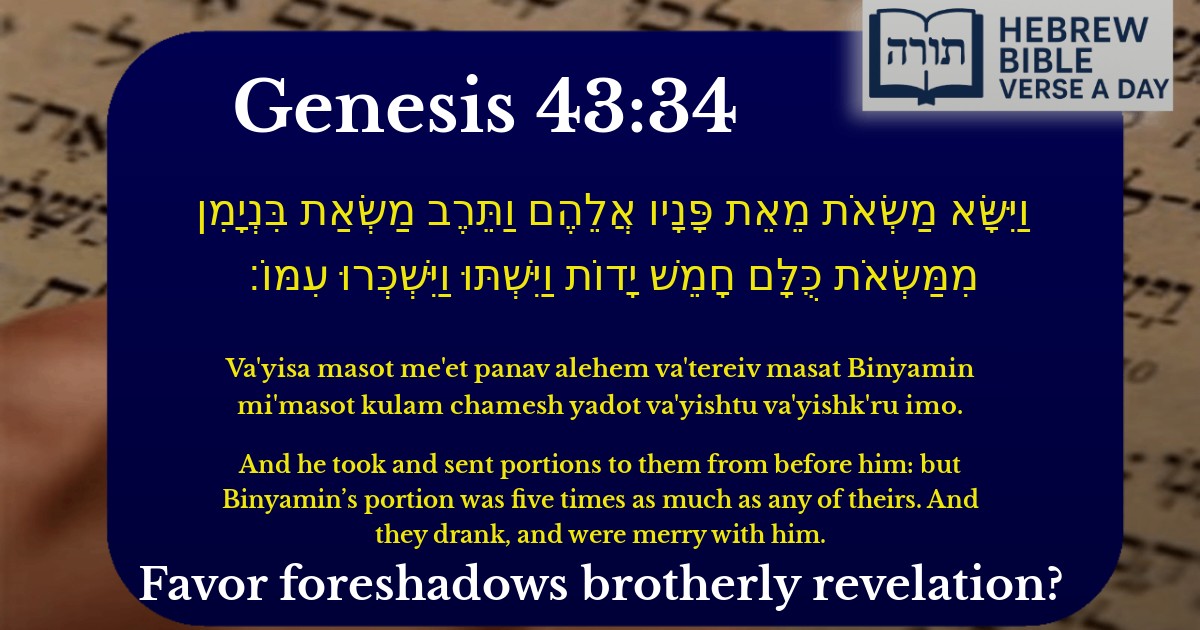Join Our Newsletter To Be Informed When New Videos Are Posted
Join the thousands of fellow Studends who rely on our videos to learn how to read the bible in Hebrew for free!
Hebrew Text
וַיִּשָּׂא מַשְׂאֹת מֵאֵת פָּנָיו אֲלֵהֶם וַתֵּרֶב מַשְׂאַת בִּנְיָמִן מִמַּשְׂאֹת כֻּלָּם חָמֵשׁ יָדוֹת וַיִּשְׁתּוּ וַיִּשְׁכְּרוּ עִמּוֹ׃
English Translation
And he took and sent portions to them from before him: but Binyamin’s portion was five times as much as any of theirs. And they drank, and were merry with him.
Transliteration
Va'yisa masot me'et panav alehem va'tereiv masat Binyamin mi'masot kulam chamesh yadot va'yishtu va'yishk'ru imo.
Hebrew Leining Text
וַיִּשָּׂ֨א מַשְׂאֹ֜ת מֵאֵ֣ת פָּנָיו֮ אֲלֵהֶם֒ וַתֵּ֜רֶב מַשְׂאַ֧ת בִּנְיָמִ֛ן מִמַּשְׂאֹ֥ת כֻּלָּ֖ם חָמֵ֣שׁ יָד֑וֹת וַיִּשְׁתּ֥וּ וַֽיִּשְׁכְּר֖וּ עִמּֽוֹ׃
וַיִּשָּׂ֨א מַשְׂאֹ֜ת מֵאֵ֣ת פָּנָיו֮ אֲלֵהֶם֒ וַתֵּ֜רֶב מַשְׂאַ֧ת בִּנְיָמִ֛ן מִמַּשְׂאֹ֥ת כֻּלָּ֖ם חָמֵ֣שׁ יָד֑וֹת וַיִּשְׁתּ֥וּ וַֽיִּשְׁכְּר֖וּ עִמּֽוֹ׃
🎵 Listen to leining
Parasha Commentary
📚 Talmud Citations
This verse is not quoted in the Talmud.


Yosef's Special Treatment of Binyamin
The verse (Bereishit 43:34) describes Yosef giving portions to his brothers, with Binyamin receiving five times more than the others. Rashi explains that this was a subtle hint from Yosef, alluding to the future when Binyamin's descendant Mordechai would wear five royal garments (Esther 8:15). This reflects the principle that events in the Torah foreshadow future occurrences (מדרש תנחומא).
The Significance of Five Portions
Ramban offers additional insights:
The Festive Atmosphere
The Talmud (Megillah 16b) notes that the phrase "וישכרו עמו" ("and were merry with him") teaches that when Yosef's brothers drank, they drank moderately, maintaining their dignity. This contrasts with Egyptian drinking customs, showing the brothers' moral superiority even in a foreign land.
Midrashic Interpretation
The Midrash Rabbah (Bereishit 92:5) explains that Yosef's actions served multiple purposes:
Moral Lesson
The Kli Yakar emphasizes that Yosef's conduct teaches the importance of showing extra kindness to family members, particularly when they might feel vulnerable in unfamiliar circumstances. The brothers' acceptance of Binyamin's preferential treatment demonstrated their personal growth since the sale of Yosef.